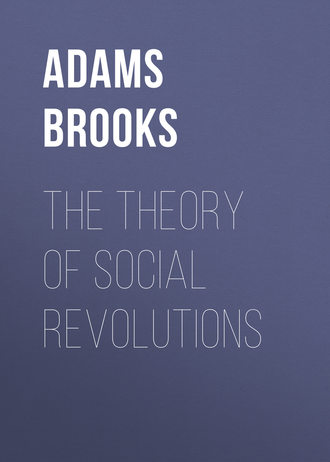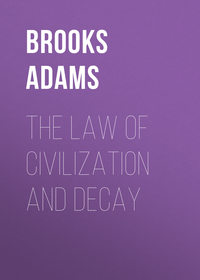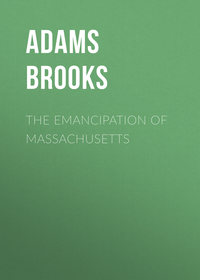 полная версия
полная версияThe Theory of Social Revolutions
As I stated at the beginning of this chapter, history never can repeat itself; therefore, whatever else may happen in the United States, we certainly shall have no Revolutionary Tribunal like the French Tribunal of 1793, but the mechanical principle of the political court always remains the same; it is an administrative board the control of which is useful, or may be even essential, to the success of a dominant faction, and the instinctive comprehension which the American people have of this truth is demonstrated by the determination with which they have, for many years, sought to impose the will of the majority upon the judiciary. Other means failing to meet their expectations, they have now hit on the recall, which is as revolutionary in essence as were the methods used during the Terror. Courts, from the Supreme Court downward, if purged by recall, or a process tantamount to recall, would, under proper stress, work as surely for a required purpose as did the tribunal supervised by Fouquier-Tinville.
These considerations rather lead me to infer that the extreme complexity of the administrative problems presented by modern industrial civilization is beyond the compass of the capitalistic mind. If this be so, American society, as at present organized, with capitalists for the dominant class, can concentrate no further, and, as nothing in the universe is at rest, if it does not concentrate, it must, probably, begin to disintegrate. Indeed we may perceive incipient signs of disintegration all about us. We see, for example, an universal contempt for law, incarnated in the capitalistic class itself, which is responsible for order, and in spite of the awful danger which impends over every rich and physically helpless type should the coercive power collapse. We see it even more distinctly in the chronic war between capital and labor, which government is admittedly unable to control; we see it in the slough of urban politics, inseparable from capitalistic methods of maintaining its ascendancy; and, perhaps, most disquieting of all, we see it in the dissolution of the family which has, for untold ages, been the seat of discipline and the foundation of authority. For the dissolution of the family is peculiarly a phenomenon of our industrial age, and it is caused by the demand of industry for the cheap labor of women and children. Napoleon told the lawyers who drafted the Code that he insisted on one thing alone. They must fortify the family, for, said he, if the family is responsible to the father and the father to me, I can keep order in France. One of the difficulties, therefore, which capital has to meet, by the aid of such administrative ability as it can command, is how to keep order when society no longer rests on the cohesive family, but on highly volatilized individuals as incohesive as grains of sand.
Meditating upon these matters, it is hard to resist the persuasion that unless capital can, in the immediate future, generate an intellectual energy, beyond the sphere of its specialized calling, very much in excess of any intellectual energy of which it has hitherto given promise, and unless it can besides rise to an appreciation of diverse social conditions, as well as to a level of political sagacity, far higher than it has attained within recent years, its relative power in the community must decline. If this be so the symptoms which indicate social disintegration will intensify. As they intensify, the ability of industrial capital to withstand the attacks made upon it will lessen, and this process must go on until capital abandons the contest to defend itself as too costly. Then nothing remains but flight. Under what conditions industrial capital would find migration from America possible, must remain for us beyond the bounds even of speculation. It might escape with little or no loss. On the other hand, it might fare as hardly as did the southern slaveholders. No man can foresee his fate. In the event of adverse fortune, however, the position of capitalists would hardly be improved by the existence of political courts serving a malevolent majority. Whatever may be in store for us, here at least, we reach an intelligible conclusion. Should Nature follow such a course as I have suggested, she will settle all our present perplexities as simply and as drastically as she is apt to settle human perturbations, and she will follow logically in the infinitely extended line of her own most impressive precedents.
1
Charles River Bridge v. Warren Bridge, II Peters, 608, 609.
2
Fitchburg R.R. v. Gage, 12 Gray 393, and innumerable cases following it.
3
See the decisions of the Commerce Court on the Long and Short-Haul Clause. Atchison, T.&S.F. By. v. United States, 191 Federal Rep. 856.
4
Darcy v. Allein, 11 Rep. 84.
5
68 Pa. 173.
6
The relation of courts to legislation in European countries has been pretty fully considered by Brinton Coxe, in Judicial Power and Constitutional Legislation.
7
Federalist No. LXXVIII.
8
The Federalist, No. LXXVIII.
9
The Federalist, No. LXXVIII.
10
Cohens v. Virginia, 6 Wheaton 415.
11
To Madison, Ford, 9, 275.
12
Marshall's constitutional doctrine was not universally accepted, even in the courts of the northern states, until long afterward. As eminent a jurist as Chief Justice Gibson of Pennsylvania, as late as 1825, gave a very able dissenting opinion in opposition in Eakin v. Raub, 12 S.&R., 344.
13
Memoirs, I, 322.
14
Hepburn v. Griswold, 8 Wallace 603. Decided in conference on Nov. 27, 1869, more than a month before Grier's resignation. Knox v. Lee, 12 Wallace 457.
15
157 U.S. 608.
16
Pollock v. The Farmers' Loan & Trust Co., 158 U.S. 715.
17
In 1889 Mr. J.C. Bancroft Davis compiled a table of the acts of Congress which up to that time had been held to be unconstitutional. It is to be found in the Appendix to volume 131 U.S. Reports, page CCXXXV. Mr. Davis has, however, omitted from his list the Dred Scott Case, probably for the technical reason that, in 1857, when the cause was decided, the Missouri Compromise had been repealed. Nevertheless, though this is true, Tansy's decision hinged upon the invalidity of the law.
Besides the statutes which I have mentioned in the test, the two most important, I suppose, which have been annulled, have to me no little interest. These are the Civil Rights Act of 1875, and the Employers' Liability Act of 1906. The Civil Rights Act of 1875 grew rapidly unpopular, and the decision which overturned it coincided with the strong drift of opinion. The Civil Rights Cases were decided in October, 1883, and Mr. Cleveland was elected President in 1884. Doubtless the law would have been repealed had the judiciary supported it. Therefore this adjudication stood.
On the other hand, the Employers' Liability Act of 1906 was held bad because Congress undertook to deal with commerce conducted wholly within the states, and therefore beyond the national jurisdiction. The Court, consequently, in the Employers' Liability Cases, simply defined the limits of sovereignty, as a Canadian Court might do; it did not question the existence of sovereignty itself. In 1908 Congress passed a statute free from this objection, and the Court, in the Second Employers' Liability Cases, 223 U.S. 1, sustained the legislation in the most thoroughgoing manner. I know not where to look for two better illustrations of my theory.
18
6 Cranch 135.
19
New Jersey v. Wilson, 7 Cranch 164; decided in 1812.
20
Coates v. Mayor of New York, 7 Cowen 585.
21
Charles River Bridge v. Warren Bridge, 11 Peters 420, 553.
22
Boston & Maine Railroad v. County Commissioners, 79 Maine 393.
23
Wynehamer v. The People, 13 N.Y. 393.
24
Mugler v. Kansas, 133 U.S. 623.
25
Fertilizing Co. v. Hyde Park, 97 U.S. 659.
26
Slaughter House Cases, 16 Wallace 78, decided in 1873.
27
94 U.S. 113.
28
Chicago, Milwaukee & St. Paul Ry. v. Minnesota, 134 U.S. 461, decided March 24, 1890.
29
Noble State Bank v. Haskell, 219 U.S. 104.
30
See the extraordinary case of Douglas v. Kentucky, 168 U.S. 488, which must be read in connection with Gregory v. Trustees of Shelby College, 2 Metc. (Kentucky) 589.
31
Brass v. North Dakota, 133 U.S. 391.
32
169 U.S. 466.
33
The Federalist, No. LXXVIII.
34
221 U.S. 91.
35
60th Congress, 2d Session, Senate, Report No. 848, Adverse Report by Mr. Nelson, Amending Anti-trust Act, January 26, 1909, page 11.
36
Standard Oil Company v. United States, 221 U.S. 1.
37
United States v. American Tobacco Company, 221 U.S. 191, 192.
38
221 U.S. 69.
39
To Spencer Roane, Sept. 6, 1819, Ford, 10, 141.
40
Histoire du Tribunal Revolutionaire de Paris, H. Wallon, I, 57.
41
"C'est demain qu'on me tue; n'êtes-vous donc qu'un lache?"
42
In these observations on the intellectual tendencies of capital I speak generally. Not only individual capitalists, but great corporations, exist, who are noble examples of law-abiding and intelligent citizenship. Their rarity, however, and their conspicuousness, seem to prove the general rule.
43
By the Law of November 27, 1790, priests refusing to swear allegiance to the "civil constitution" of the clergy were punished by loss of pay and of rights of citizenship if they continued their functions. By Law of August 26, 1792, by transportation to Cayenne.



